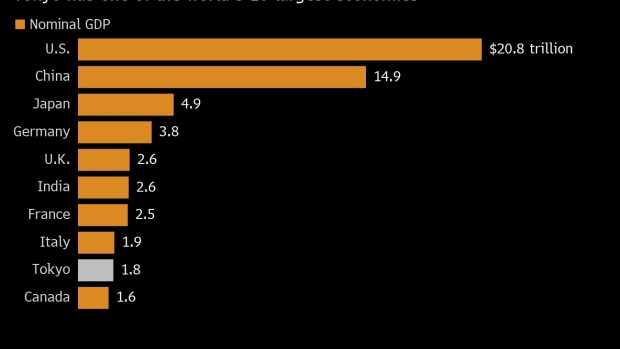Jan 7, 2021
Suga’s Bet on Softer Tokyo Emergency Risks Worse Economic Pain
, Bloomberg News

(Bloomberg) -- Japanese Prime Minister Yoshihide Suga’s bet that a less-stringent state of emergency will limit the economic damage of virus containment runs the risk of compounding the pain if it proves insufficient.
More analysts now see the economy shrinking again for the first time since the summer, as they recalculate projections in light of Suga’s emergency declaration covering Tokyo and its neighboring prefectures.
They warn that the full economic impact will depend on whether the lighter measures are enough to rein in the spread of Covid-19.
Read More: Japan Declares Virus Emergency for Tokyo Amid Record Cases
Success will mean solving the country’s health crisis without sacrificing too much economic activity and perhaps boosting Suga’s credentials as a long-term leader of Japan.
Failure could mean more deaths in a prolonged emergency that goes nationwide, a much bigger hit to the economy and Suga’s demise as prime minister later in the year.
Even before the declaration, Suga was facing a tighter timetable than his global peers to keep a lid on the virus and fuel the recovery with an Olympic Games scheduled for the summer and a national election due by the autumn.
“We just don’t know how long the measures will stay in place, especially given that the steps aren’t that restrictive,” said economist Harumi Taguchi at IHS Markit. “We really don’t know if they’re going to be enough to contain the virus.”
A record 2,447 new cases in Tokyo on Thursday already represents a far larger number than the 100 plus daily infections seen in the capital before the April emergency, adding to fears that the lighter measures may be inadequate. Concern continues to build that hospitals will soon run out of beds for serious cases.
The uncertainty is forcing economists to game out a range of possible scenarios. In good scenarios, the current measures last one month and affect only greater Tokyo, as planned.
Even that will hurt the economy because the capital and its surrounding prefectures generate about a third of Japan’s gross domestic product.
In worse scenarios, in which restrictions have to be tightened, widened and held in place for longer, the damage will be much larger.
Bloomberg Economics’ Yuki Masujima calculates a good scenario shaving 0.4% off the economy per month compared with 0.7% per month if tougher restrictions are brought in across the country.
“Tougher nationwide restrictions would likely wipe out growth for the whole of 2021,” Masujima said.
What Bloomberg Economics Says...
“The one-month period looks ambitious to us, considering last year’s state of emergency -- with tighter restrictions -- was maintained for a month and a half to combat a much smaller wave of infections.”
-- Yuki Masujima, economist
For the full report, click here.
For economist Takahide Kiuchi at Nomura Research Institute Ltd., the most likely scenario is a two-month emergency limited to greater Tokyo that causes an 13.1% drop in consumption this quarter and up to a 10% annualized fall in GDP. If the restrictions last two months and spread nationwide, the fall in consumption will almost double, according to the former Bank of Japan board member.
While economists agree the economy will suffer, not all of them see a contraction as clearcut. Naohiko Baba, Tomohiro Ota and Yuriko Tanaka at Goldman Sachs project the economy ekeing out annualized growth of 0.2% during the emergency-affected quarter. They also estimate that half the population could be vaccinated by the summer, leading to a stronger recovery than the consensus view.
Read More: What Will Tokyo’s Second State of Emergency Mean?
Japan’s latest emergency measures certainly look nothing like the lockdowns reinstated in some parts of Europe recently. They’re also far less sweeping than measures in the spring that kept much of the country homebound for five weeks and triggered the economy’s worst contraction on record.
Instead, bars and restaurants have been asked to close by 8 p.m. and people to avoid going out after that hour. Businesses and schools are allowed to stay open. A national travel discount campaign to boost the tourism industry, already suspended through this weekend, remains on hold during the state of emergency.The emergency is set to run through Feb. 7, with compliance voluntary, though Suga is seeking to amend Japanese law so the rules can be enforced.
Suga took the reins of the economy last year after the pandemic had wiped out most of the gains made during almost eight years of Abenomics, the economic strategy of his predecessor that Suga vowed to continue.
The strategy, which depended on a virtuous cycle of higher profits driving wage and price gains, seemed broken even before the latest declaration of emergency.
While economic aid from the government and the BOJ has so far helped keep unemployment and bankruptcies at enviably low rates during the pandemic, crisis spending pushed Japan’s government debts to 266% of GDP, according to the International Monetary Fund. That was before last month’s additional stimulus.
Meanwhile, declining pay, the fastest falls in prices in a decade and the biggest cut to winter bonuses since the global financial crisis suggest that the virtuous mechanism was already well out of kilter by the end of last year.
Suga might have hoped that his $710 billion stimulus package last month might go some way to refiring that engine, but its impact is likely to be delayed or diluted now that activity has been restricted.
©2021 Bloomberg L.P.